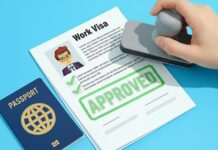For anyone planning to move, work, or study in the United Kingdom, few parts of the journey feel as uncertain as the visa process. You gather your documents, pay the fees, attend your biometric appointment and then comes the waiting. Days turn into weeks, sometimes even months, and you start wondering: Is something wrong with my application? The truth is, waiting for a UK visa decision can test anyone’s patience. But understanding how the system works—and what you can do to speed things up—can make a world of difference. This guide breaks down how UK visa processing times really work in 2025, what causes delays, and how to avoid them when applying from outside the UK.
What the Home Office Says About Processing Times
The UK Home Office publishes estimated processing times for each visa route. These are not promises, but service standards the Home Office aims to meet under normal circumstances. The standard timeframes depend on the type of visa you apply for and where you apply from. For most temporary visas (known as “non-settlement” visas), decisions are made within three weeks—that’s 15 working days after your identity has been verified. Settlement visas, such as family and partner applications, take longer—usually up to 12 weeks or more. Here’s a table summarising the average 2025 processing times for applications submitted from outside the UK:
| Visa Category | Typical Processing Time | Example Visas | Notes |
|---|---|---|---|
| Visit visas | 3 weeks | Standard Visitor, Marriage Visitor, Transit | Counted in UK working days (Monday–Friday) excluding public holidays. |
| Study visas | 3 weeks | Student, Child Student, Short-term study (6–11 months) | Time starts after biometric verification or ID app submission. |
| Work visas | 3 weeks | Skilled Worker, Health and Care Worker, Global Business Mobility | Applies to most employment-based routes. |
| Family visas (joining family) | 12 weeks | Partner, Spouse, Parent, Child, Adult Dependant | Longer window; applicants should avoid last-minute submissions. |
| Temporary & other work visas | 3 weeks | Creative Worker, Seasonal Worker, Youth Mobility, Innovator Founder | Depends on job type and visa subcategory. |
| Ukraine scheme | 3 weeks | Homes for Ukraine | Separate humanitarian process but similar timeframe. |
| Other routes | 3–12 weeks | BN(O) visa (12 weeks), International Sportsperson (3 weeks) | Varies by category and documentation required. |
When the Clock Really Starts
One of the biggest misconceptions about visa processing is when the countdown begins. It doesn’t start the moment you hit submit on your online form. For UK visa applications made outside the country, the processing time officially starts after you have completed identity verification—either by attending your appointment at a Visa Application Centre (VAC), or submitting your biometrics through the UK Immigration: ID Check app. Once your information has been verified, your application enters the Home Office system and joins the processing queue. The end point is when you receive an email or letter informing you of the decision—not when you collect your passport. It’s important to note that passport collection and courier delivery can add extra days after your visa decision is made. That’s why it’s wise not to make travel plans until your documents are physically back in hand.
Why Some Applications Take Longer
Although the Home Office sets out clear service standards, not every case follows the schedule perfectly. Some applications are flagged as not straightforward, which can trigger additional checks or requests for information. Common reasons for delays include missing or incomplete documents, discrepancies in financial evidence, needing to verify information with an employer, university, or sponsor, a request for an interview or additional biometrics, or security and background checks that require more time. In these cases, the Home Office usually contacts applicants to request extra information. If you’ve not received any communication and your application has passed the standard timeframe, that’s when you may consider following up through official channels.
How to Minimise Delays Before You Apply
The most effective way to prevent delays is simple: submit a complete and accurate application the first time. Small errors—like mismatched dates, missing documents, or incomplete forms—cause a large percentage of the delays seen by immigration officers. Here’s how to give your application the best chance of smooth processing: double-check your documents to ensure that every supporting document listed in the Home Office guidance is included, clear, and correctly formatted. Match your information across forms so dates, addresses, and employment history remain consistent. Provide financial evidence correctly, as many visa types require proof of funds held for a certain period. And avoid applying too close to your intended travel date—always allow a few extra weeks as a safety margin. Remember, the Home Office processes millions of applications each year. The more straightforward your submission, the faster it can move through the system.
When Time Is Critical: Priority and Super Priority Services
If you’re working with tight deadlines, the UK offers Priority and Super Priority services in many countries. The Priority Service aims to deliver a decision within 5 working days, while the Super Priority Service promises a decision by the next working day. These fast-track services come at an extra cost and aren’t available for all visa categories or countries. For instance, family visas might not qualify for the faster route in some regions. While these options speed up decision-making, they don’t increase your chances of approval. The Home Office still reviews your eligibility, documents, and financial details thoroughly. Paying extra only moves your application higher in the queue—it doesn’t override the standard requirements. If you choose to use a fast-track service, be sure that your documents are ready to go. Once submitted, missing paperwork can still delay your outcome, even under the priority system.
How Early Should You Apply?
The golden rule is: apply as early as possible. For students, that means submitting your visa application as soon as you receive your CAS (Confirmation of Acceptance for Studies). For workers, apply immediately after your sponsor issues your Certificate of Sponsorship (CoS). Family applicants should apply at least three months before the intended travel date, given the longer timelines. If you’re planning to relocate by a certain month, count backwards from your target arrival date and factor in both processing time and document return. For example, if you intend to start work in the UK on July 1st, aim to submit your visa application by early May. This gives enough cushion for processing, possible queries, and passport delivery.
A Smoother Process with Professional Guidance
Navigating visa timelines can be overwhelming, especially when every delay affects your study, job, or relocation plans. Working with a trusted immigration consultant can help you avoid common mistakes that slow down decisions. Consultants review your documents, flag inconsistencies before submission, and ensure your application meets current Home Office standards. At Smith Stone Walters (now part of Envoy Global), we support individuals, families, and employers through every stage of the UK immigration process. From document preparation to submission tracking, our goal is to simplify what often feels like a maze of paperwork and waiting.
Final Thoughts
Visa waiting times can feel unpredictable, but they rarely are. Once you understand when the clock starts, what the standard timelines are, and how to avoid preventable errors, the process becomes far more manageable. Apply early, submit accurate documents, keep communication open, and if your situation is complex or time-sensitive, seek professional support to guide you through. The UK immigration system is intricate, but it rewards preparation. A well-prepared application not only shortens your wait but also gives you peace of mind—the kind that makes stepping into your new chapter in the UK a little easier.
Discover more from MUZZLECAREERS
Subscribe to get the latest posts sent to your email.








